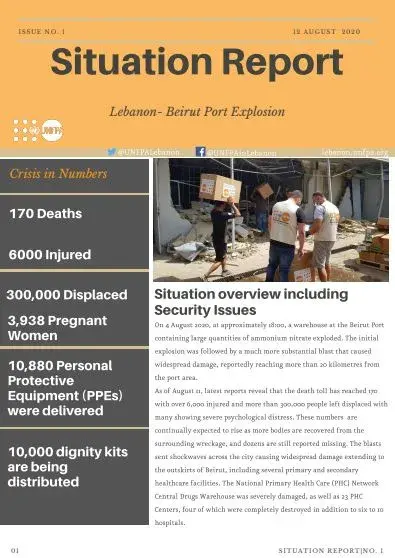On 4 August 2020, at approximately 18:00, a warehouse at the Beirut Port containing large quantities of ammonium nitrate exploded. The initial explosion was followed by a much more substantial blast that caused widespread damage, reportedly reaching more than 20 kilometres from the port area.
As of August 11, latest reports reveal that the death toll has reached 220 with over 7,000 injured and more than 300,000 people left displaced with many showing severe psychological distress. These numbers are continually expected to rise as more bodies are recovered from the surrounding wreckage, and dozens are still reported missing. The blasts sent shockwaves across the city causing widespread damage extending to the outskirts of Beirut, including several primary and secondary healthcare facilities. The National Primary Health Care (PHC) Network Central Drugs Warehouse was severely damaged, as well as 23 PHC Centers, 4 of which were completely destroyed in addition to 6-10 hospitals.
A report by the World Health Organization (WHO) indicates that more than 80 primary health care centres have been severely damaged. Preliminary assessments show that an estimated 15 hospitals were significantly impacted by the blast and a minimum of three have been rendered partially or fully inoperable. A rapid assessment of 55 primary health care centres found that 37 per cent sustained moderate-to-serious damage. Only 47 per cent of surveyed facilities can still provide full routine health services. Moreover, 120 schools, used by 55,000 Lebanese and non-Lebanese children, sustained various levels of damage. Humanitarian partners are conducting further damage assessments, in close coordination with relevant government authorities.
The Beirut Port, which processes up to 90 per cent of Lebanon’s imports, is expected to remain inoperable for at least one month, pending repairs, debris removal, and safety clearances. Concerns are growing that damage to the Beirut Port will exacerbate food insecurity, which was already growing amid the COVID-19 pandemic and prolonged socio-economic crisis. All trade activities have been redirected to the Tripoli Port, located about 85 kilometres north of Beirut.




